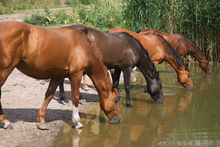In partnership with the Ontario Ministry of Agriculture and Food, Equine Guelph is developing a 'Full Circle Responsibility' equine welfare educational initiative which stands to benefit the welfare of horses in both the racing and non-racing sectors. In their Full-Circle-Responsibility Code Section 3, they address the issues of feed and water for your horse.

Getting it right - Feed and water for your horse
The digestive tract of the horse is actually beautifully designed for what it was intended to do â graze on a variety of grasses for 16 to 18 hours per day, with access to water, friends and movement.
How many times have you heard that the digestive tract of the horse âis a disaster waiting to happenâ? With so many serious issues that can plague the horse, it is a wonder the horse survived at all....... or is it?
The digestive tract of the horse is actually beautifully designed for what it was intended to do â graze on a variety of grasses for 16 to 18 hours per day, with access to water, friends and movement.
Domestication and human needs (financial and convenience) have altered the preferred lifestyle of the horse and in turn have placed demands on the digestive system that are not part of its natural lifestyle. Sometimes the horse is not able to cope or tolerate those changes and demands and that is when health and welfare are compromised.
It's not just about the food and water - it's also about what kind, when and how it is provided.
Water is one of the most important nutrients and it is important that we provide adequate amounts of quality water year-round from safe sources. More will be required in the summer months, during pregnancy and lactation and for hard working horses. It is equally important that water is provided to horses during the winter, as snow will not provide their water requirements.
A forage based diet (hay and/or grass making up the bulk of the intake) is best for the health of the digestive tract, particularly when horses are allowed to forage naturally (good pastures, slow feeding nets, etc.) to obtain optimal forage amounts.
Concentrates (grains, commercially prepared feeds) and supplements (vitamin/mineral balancers) should be used specifically for the needs of the individual horse for its stage of life and use and to supplement the forage as needed.
Be aware that individual horses may have special needs so the diet must be tailored to fit the individual â this would include growing foals, working horses, mares in foal or lactating, breeding stallions, overweight or underweight horses, seniors and those with health issues that require specialized diets.
Specific information on special needs diets can be found in the Codeand by consulting with an experienced equine nutritionist.
As horses cannot vomit, all feed must be free of contaminants, mould, dust and poisonous plants to avoid related issues. It is also important that any chosen feed is specifically designed for horses and not for other livestock. Improper feeding can result in serious health issues, abnormal behaviours and even death. With the provision of proper diets
and management practices, the horse will be healthier and its welfare will be
maintained.
To learn more about horses water requirements and needs for a forage-based diet optimized for their individual needs, the new Canadian Code of Practice helps horse owners make better decisions about management practices that will support the health and welfare of the horse and just as important, prevent many of the common management related issues that can cause pain and distress to the horse.
The new Code Decoder tool developed by Equine Guelph, can help all of us learn about better feeding management. It also allows horse owners to easily assess their own practices to make improvements to standards of care.
Take a look in the resources section for more handy information sheets and management tools addressing dehydration, nutrition, senior horse health and colic. We must all be familiar with our new Code of Practice and the standards set out in this document.
Sign up for our free e-newsletter which will deliver monthly welfare tips throughout 2015 and announce tools to aid all horse owners in carrying out their âFull Circle Responsibilityâ to our beloved horses.
Visit Equine Guelph's Code Decoder tool: the fast and easy way to learn the National Code of Practice for the Care and Handling of Equines.
